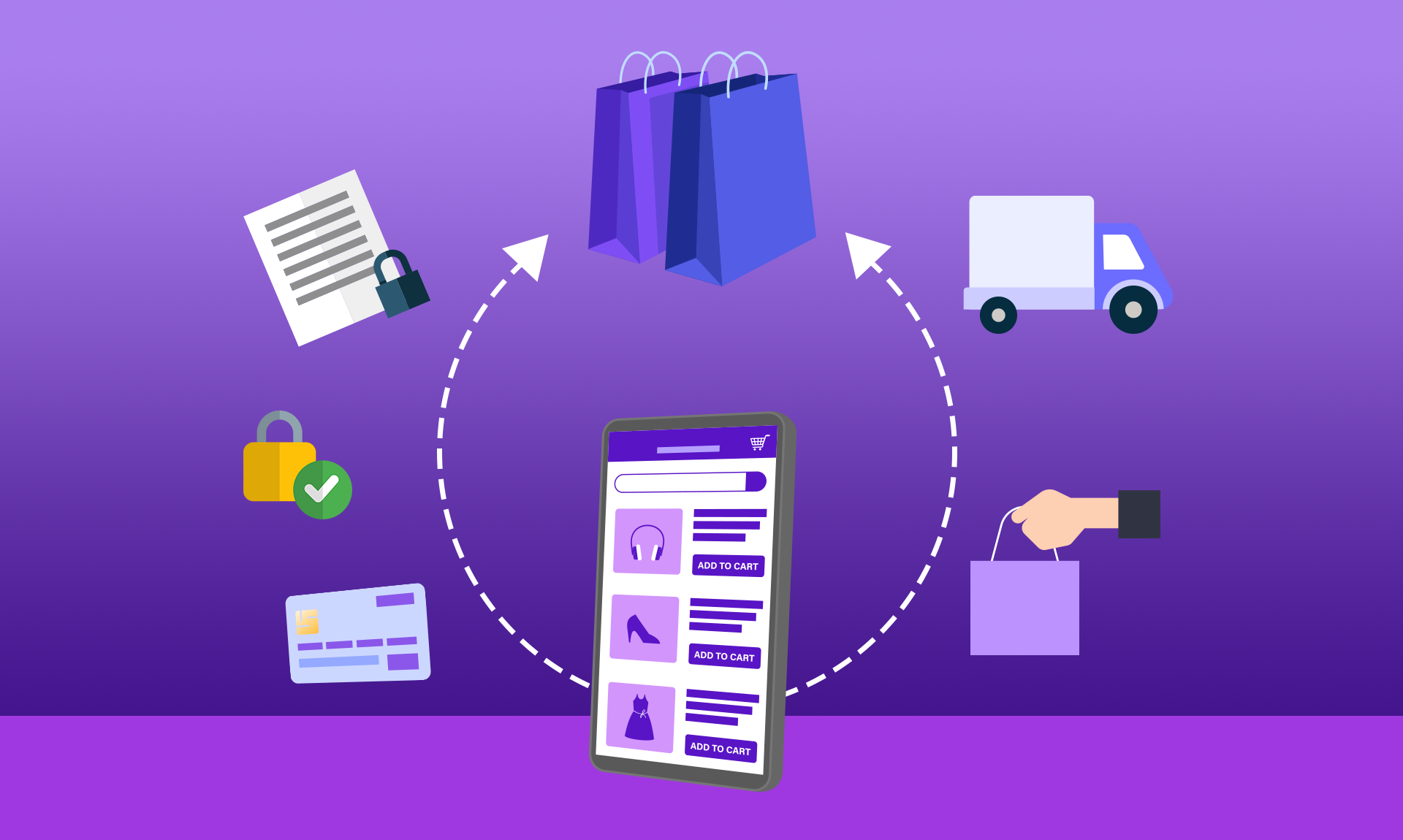Ecommerce is an always-on, 24/7 job. To keep up, you’ll want to have the right tools in your pocket to help manage, streamline and grow your eCommerce business.
But with so many tools to choose from, it can be difficult to know which ones are worth trying. Below, we review 28 of the best eCommerce tools on the market today and what makes them so useful. Whether you’re looking for a platform to host your site or something to make your day-to-day life easier, these tools can help you keep up with the fast-paced, demanding nature of online shopping.

What is an eCommerce tool?
An eCommerce tool is a kind of program or application that is intended to facilitate the management of your online store. These solutions simplify a number of online selling processes, including as creating websites, accepting payments online, managing inventories, and providing customer support. Certain eCommerce tools are made to address a specific issue, while others are made to function as comprehensive solutions.
Types of eCommerce tools
Whether you’re expanding an already-existing business or launching your first online store, you’ll probably find yourself searching for tools in a number of different categories:
- Ecommerce website builders: platforms that let you design your website and give your consumers a satisfying buying experience. Take a look at the eCommerce platforms we propose.
- Keyword research: Tools that provide insight into what customers are googling or typing into the search bar when shopping online.
- Shipping and logistics: Solutions that offer visibility into and assistance with the shipping process, so you can deliver products to your customers faster and more reliably.
- Business management: Tools for helping you run your business, whether that has to do with customer management, project management, accounting or something else.
- Marketing: Tools for promoting your products and brand, be it through email, SEO or other channels.
- Website analytics: Tools that give you insight into the performance of your web pages (e.g., your homepage, product pages and blogs) so that you can optimize your site to attract more conversions or traffic.
Let’s explore a few of the top contenders in each of these categories.
28 Best Ecommerce tools worth trying
- Wix
- BigCommerce
- Shopify
- WooCommerce
- Google Keyword Planner
- Google Trends
- Semrush
- Jungle Scout
- Modalyst
- ShipStation
- Shippo
- Wix Members Area
- Avalara
- Asana
- Trello
- monday.com
- Slack
- Wix’s free tools
- Klaviyo
- Canva
- Omnisend
- Buffer
- Hootsuite
- Wix Analytics
- Google Analytics
- Hotjar
- Kissmetrics
- TWIPLA
Ecommerce website builders
With the top eCommerce platforms, you can relax knowing that your website is well-built and has a professional appearance. Even while a platform’s web design features may first draw you in, keep an eye out for other benefits that cover marketing, customer support, and other essential business functions. These features can protect your online store from malfunctions and save you the trouble (and expense) of juggling several tools.
01. Wix
One of the industry leaders in website creation, Wix provides hundreds of free online shop designs together with a drag-and-drop editor to make web design easier. It also has an AI website builder that lets you communicate with AI to construct a fully functional website in a matter of minutes.
The platform has a ton of capabilities that are necessary for eCommerce. Along with AI-powered tools for product descriptions, photos, and recommendations, they include built-in solutions for inventory management, multichannel sales, marketing, eCommerce UX, eCommerce merchandising, and dropshipping. Wix offers its own native solution in addition to supporting more than 80 payment gateways. If Wix’s toolkit isn’t enough for your needs, you may check through its sizable App Market for a well selected selection of options.
All Wix sites are built to scale. With 99.98% uptime and enterprise-grade security, Wix makes sure that your online store can withstand spikes in traffic, cyber-attacks and other potential threats as it grows.
02. BigCommerce
With an emphasis on enterprise operations, BigCommerce offers solutions for companies of all sizes. The advanced features of the platform, such as its powerful inventory tracking and management capabilities, are what make it appealing. BigCommerce provides assistance for international shipping, wholesaling, and other services for larger businesses.
BigCommerce features pre-designed “themes” that may be modified with HTML or CSS, as well as a drag-and-drop editor. Themes usually have a cost associated with them, but they also include some essential eCommerce functionalities like inventory management and marketplace connections. In addition, BigCommerce supports over 65 pre-integrated online payment options and has an app marketplace targeted at store optimization.
03. Shopify
Shopify is a website builder made specifically for online retailers. Like other platforms mentioned above, you have access to over 100 free or paid templates that you may change to your desire using drag-and-drop capability.
Even while Shopify has built-in capabilities for recovering abandoned carts, discount codes, and other things, you might need to use its enormous third-party software library. But bear in mind that a lot of these apps will cost extra money.
In addition, Shopify Magic drives a number of AI features seen in the main platform, such as email generation, picture editing, and product descriptions. You can also easily set up online payments using Shopify Payments, but there are more than 100 different third-party payment providers that have interfaces with Shopify.
04. WooCommerce
WooCommerce carves out a distinct market niche. This plugin is free and made to be used with WordPress websites. So, WooCommerce might be an excellent choice if you’ve already created a WordPress website, such as a blog, and you want to start selling goods on it. You can completely alter your website anyway you see fit with WooCommerce.
There is a bit of a learning curve when utilizing WooCommerce if you are not familiar with WordPress. Furthermore, unlike other options like Wix that come with hosting, you will be in charge of locating a host. Additionally, you’ll be in charge of website security, upkeep, and updates.

Keyword research tools
Although it takes constant effort to get to know your clients, keyword research tools can assist you understand them based on their search history. Keywords can indicate what your customers could be most interested in both now and in the future, since according to Search Engine Land, 50% of product searches begin on Amazon and another 31.5% begin on Google.
05. Google Keyword Planner
The fact that Google Keyword Planner is completely free is its biggest feature. To access it, though, you’ll need to create a Google Ads account. After registering, you may use the Keyword Planner to monitor search trends for particular keywords related to your company. Remember that search volumes and other information are derived from paid, not organic, traffic and are intended for use by advertisers. This study can help direct your Google AdWords ads and, to a lesser extent, your website’s SEO strategy.
06. Google Trends
Google Trends is another free tool that makes it simple to investigate customer preferences over various time periods and geographical areas. To find out how popular they are online, you may search for anything from “mini waffle maker” to “Academy Awards.” Google Trends can assist you in monitoring popular items, seasonal demand, and new industry trends by giving you access to real-time data on search searches.
07. Semrush
SEOs and other marketing experts use Semrush, a well-liked subscription platform. With its user-friendly Keyword Magic tool, you can look up the search volume for any term or phrase that piques your interest. Beyond this, the platform provides sophisticated tools for analyzing how well your website performs in comparison to that of your rivals. You can also investigate various marketing techniques (both sponsored and organic options) to generate buzz about your company through its many reports.
08. Jungle Scout
A keyword research tool designed only for Amazon sellers is called Jungle Scout. Whether you use Amazon as your main sales channel or as an addition to your online store, Jungle Scout can offer priceless information about the competitiveness, profitability, and popularity of specific products on the platform.
Ecommerce logistics tools
Logistics can be a messy ordeal, but eCommerce logistics tools can help your business stay afloat. From keeping your inventory in check to connecting you with reliable shipping partners, these tools can simplify the process of getting products to your customers’ doorsteps.
09. Modalyst
Wix and the dropshipping platform Modalyst are completely connected. Modalyst can help you establish a dropshipping business by connecting you with reputable, pre-vetted suppliers. Products that are available for print-on-demand or dropshipping can be selected, and they can be quickly added to your catalog. First, create an account on Wix Stores to use Modalyst on Wix. Next, select Catalog -> Store Products -> Find Products to Sell. Here, you can go through additional Modalyst products.
10. ShipStation
With the shipping platform ShipStation, you can gather orders from several channels and provide your clients with personalized delivery alternatives. It offers rate reductions of up to 89% on popular carriers including UPS, DHL Express, and USPS. Additionally, ShipStation provides a wealth of sophisticated capabilities that are ideal for sellers with high volume sales.
11. Shippo
You can connect to a wide network of carriers, such as UPS, USPS, and FedEx, with Shippo’s shipping software. It syncs with several apps and marketplaces to expedite the fulfillment process and guarantees the cheapest rates from more than 40 international carriers. Send tracking codes, print shipping labels, and accomplish more quickly with Shippo. Shippo might be a more cost-effective choice for small enterprises.
Business management tools
Operating an online store requires a lot of laborious work, just like operating any other kind of business. These consist of team management, bookkeeping, and customer service, among others. Many tools can be included in this category, however the ones listed below might be very useful for your online store.
12. Wix Members Area
The creation of members-only content is made easier with the help of the Wix Members Area app, which benefits both you and your clients. You may produce, monetize, and distribute unique content on your website by linking the app to your Wix Store. This can create a feeling of community and bring in additional cash for your company.
13. Avalara
The tax automation platform from Avalara can help you stay current with the ever-changing criteria for compliance. It can also aggregate data from all of your sales channels (e.g., your online store, marketplaces, brick-and-mortar locations, etc.) and determine where you have sales tax responsibilities. Keep track of numerous dates and filing requirements while saving time while submitting your sales tax returns.
14. Asana
Businesses with large teams may find Asana to be an extremely helpful project management tool. Asana can be used to plan marketing campaigns, inventory scheduling, product launches, and other tasks. Make thorough “boards” where you can delegate work and monitor advancement, or automate processes to speed up order confirmations and inventory updates, for instance.
15. Trello
Trello sets itself apart from Asana through the use of visual tools called Kanban boards, which facilitate the progress of internal teams through each phase of a project. Users can create “cards” inside each board to assign specific tasks, add relevant files, and establish deadlines. Moreover, staff members can communicate with one another inside each card, establishing a thorough single source of truth for projects that are vital to the purpose.
16. monday.com
Monday.com provides an approach to manage your workflows, akin to Asana and Trello. You can browse Trello-like Kanban boards or organize your work on color-coded Asana-style boards. Monday.com allows you to, among other things, assign a job to numerous persons, develop automations, and keep track of “subitems” inside a project.
17. Slack
Well-liked for its capacity to unite distant and hybrid work teams, Slack is a collaboration platform. Through specific Slack channels, you can utilize Slack for project management in addition to regular communication. Teams can exchange files and have real-time idea discussions with Slack. They can use the platform to conduct polls and surveys as well as provide customer service directly.
Marketing tools
It should go without saying that you cannot sell your products on their own. A robust marketing strategy and the resources to implement it are essential to your store’s success. Although there are countless strategies to market your company, you might find the following resources helpful in your endeavors.
18. Wix’s free tools
Choose from a variety of tools, such as a logo creator, QR code generator, and landing page builder. The collection of free tools offered by Wix might help you grow your brand. The best part is that you can manage everything in one location by integrating each of these products into your Wix account.
19. Klaviyo
Email and SMS marketing automation is Klaviyo’s area of expertise. In addition, it functions as a customer data platform (CDP), centralizing all of your audience insights in one location. With Klaviyo AI, one of its most recent innovations, you can execute highly targeted campaigns, view predictive statistics, and segment audiences more effectively. Wix is one of the main eCommerce platforms with which Klaviyo interfaces.
20. Canva
A platform for graphic design is available for free at Canva. Even store owners and marketers with no background in graphic design frequently use it. Use one of Canva’s 250,000+ free templates to create eye-catching visuals for your emails, social media accounts, websites, and more. Additionally, Canva’s Magic Studio provides AI-powered tools for producing high-quality images and films. Canva provides premium subscriptions if you’re searching for more features and resources.
21. Omnisend
Omnisend is a tool for automating emails and SMS that offers fully customized templates. You can start customized campaigns that bring in merchandise straight from your web store. Along with managing numerous stores under a single multistore account, you may also add videos, gamify your emails, and provide exclusive discount codes.
22. Buffer
With social media solutions like Buffer, you can capitalize on the rapidly growing sector of social commerce, which is projected to reach a staggering $8.5 trillion by 2030. You can schedule posts on Facebook, Instagram, TikTok, and X (previously Twitter) among other social media platforms with Buffer. Keywords, hashtags, and brand mentions are all trackable. In addition, you may interact with your fans and followers on social media, conduct promotions there, and evaluate the outcomes.
23. Hootsuite
Like Buffer, Hootsuite consolidates all of your essential social media features into one location. It may be used to schedule content marketing, post content on your social media accounts, and compile content into a library for later use. Furthermore, Hootsuite will suggest material to you based on data analytics and audience demographics. Hootsuite’s social listening and brand monitoring features also let you keep an eye on client comments, react fast, and foster brand loyalty.
Website analytics tools
There is a lot of information about your clients on your website. You can leverage this by using tools like website analytics. Your site analytics can help you enhance the shopping experience and eventually increase sales by revealing which pages consumers visit more frequently and pinpointing drop-off locations.
24. Wix Analytics
You may view a range of reports with Wix Analytics, which is included with all Wix plans. Learn more about the most popular goods and pages on your website. Keep track of the hours of the day and/or origins of your most active clients. You can even look at how well your website is performing. For instance, Wix leverages actual visitor data from your website to get precise insights about site speed.
25. Google Analytics
Installing Google Analytics on your website will allow you to monitor metrics like sessions, returning vs new visitors, and more. You may see the pages that your consumers interact with the most, the sources of your website traffic, and the friction points that drive them away. Conversion rates and total income are among the other insights that Google Analytics records.
Google Analytics’s basic version is available for free. Additionally, because it is a Google product, it works well with Google Search Console and Ads, letting you optimize your website and advertising efforts.
26. Hotjar
You may more easily see how your clients engage with your online store by using Hotjar. Heat maps are a feature of this eCommerce tool that allow you to see exactly where consumers click, scroll, and interact with each of your sites. You can also view recordings of actual user sessions to determine which aspects of your online store make customers happy or annoyed. In order to receive input on how to improve your online store, you may even hire testers for your website.
27. Kissmetrics
With Kissmetrics, a behavioral analytics tool, you can monitor every step of the user journey, from the moment a visitor lands on your page until they complete the transaction. Kissmetrics is a purportedly “person-based” solution that analyzes each and every visitor to your website. In addition to data analysis breakdowns by cohorts and segments, it provides A/B testing.
28. TWIPLA
Touted as a “website intelligence platform,” TWIPLA (previously known as Visitor Analytics) provides heatmaps, session tracking, and comprehensive customer behavioral data. TWIPLA guarantees 100% GDPR and CCPA compliance tracking and is dedicated to operating without cookies.
Read More
7 main reasons why eCommerce websites fail (and how to prevent it)
7 Best eCommerce website optimization tips for driving more sales.
3 Must-Have Easy Online Payment Solutions For Your Business.




